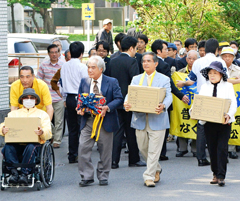Law suit to halt noise from U.S. Marine Air Station Futenma filed by 3129 people

On the morning of March 30, the plaintiffs and their legal team enter the Okinawa branch of the Naha District Court carrying cardboard boxes containing the complaint documents for the 2nd Futenma Aviation Noise Lawsuit.
March 31, 2012 Ryukyu Shimpo
On March 30, 3129 people living around U.S. Marine Corps Air Station Futenma, including the residents of Ginowan, Urasoe and Kitanakagusuku, filed a law suit with the Okinawa Branch of Naha District Court seeking to halt the noise from the base during the early morning and evening and seeking compensation for damage caused by noise pollution. This is the second time that local people have taken legal action over aircraft noise from Futenma Air Station. The number of plaintiffs for the second suit is about eight times greater than the 404 plaintiffs in the first lawsuit in 2002. This is the largest number of plaintiffs in a single lawsuit since the file lodged against Kadena Air Base in which local residents took legal action in an attempt to return the quieter days of the past.
In the complaint, the plaintiffs seek to halt noise over 40 decibels at night in the local residential area around the base from 7:00pm to 7:00am and over 65 decibels during the day from 7:00am to 7:00pm. The people demand a total of approximately 5.1 billion yen in compensation, including 34500 yen per month and future claims for the next year.
The residents seek to halt the noise from the base during the evening and also during the day, which effectively means demanding a ban on the flight activities in and out of Futenma Air Station. The lawsuit seeking to stop the flight activities of the U.S. military in Japan has been dismissed on the grounds that the Japanese government has no authority to halt them or that they have no authority over a third party. The plaintiffs and their legal team insist that their rights are constitutionally-guaranteed, and state that the Japanese government should be obliged to stop the flight operations because it has provided the facilities to the U.S. military.
At the first lawsuit, residents filed against the Japanese government and the base commander, seeking to stop noise from the base and its flight activities. In 2010, the Naha Branch of the Fukuoka High Court ordered the government to pay compensation for illegal noise damage to the plaintiffs, but it dismissed their demand to stop the flight activities based on the third party theory.
Outline of the plaintiff’s legal claims in the 2nd Futenma Aviation Noise Lawsuit:
(a) The government should not permit noise pollution from the U.S. Marine Corps Air Station Futenma in excess of 40 db in residential areas from 7:00pm to 7:00am.
(b) The government should not permit noise pollution in residential areas in excess of 65 db from the flight operations of USMCAS Futenma from 7:00am to 7:00pm.
(c) The government should pay compensation for delayed damages of 898112 yen to a plaintiff participating in the first and second lawsuits, and 1242000 yen to a plaintiff of the second lawsuit.
(d) The government should pay compensation of 34500 yen per month per person for one year from the end of the oral argument of this case.
(English translation by T&CT, Mark Ealey)
Previous Article:Residents of Henza Island pray to the ocean for prosperity at Sangwacha
Next Article:People of Koza Orphanage hold memorial service
[Similar Articles]
- Plaintiffs of Futenma helicopter roar suit call for more residents to put their hands up
- Futenma roar appeal dismissed by Supreme Court without issuing a flight ban
- Japanese government ordered to pay 754 million yen compensation for Futenma noise pollution
- Lawsuit against Kadena Base
- Residents around Kadena Air Base sue the U.S. government
 Webcam(Kokusai Street)
Webcam(Kokusai Street)


